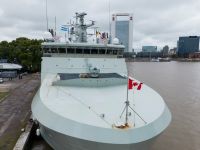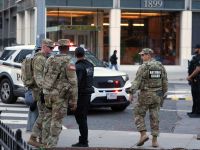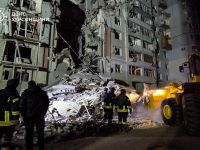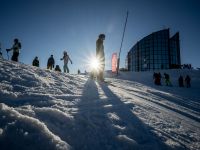In an election in which flags played a central role, one of the most important banners was hanging behind Ibrahim Rugova as the veteran nationalist claimed victory.
Flying next to the Albanian flag of a black eagle on a red plain was a blue banner with the Albanian eagle symbol in the center and the name Dardania underneath, the flag of the "presidency of Kosovo."
Next time Kosovo goes to the polls, Rugova would like to see this one used.
The United Nations had tried to prevent Kosovo Albanians displaying the Albanian flag during the weekend elections, arguing that it represented a foreign banner.
But Kosovo Albanians got their way and the banner flew over polling stations across the province.
Rugova, 56, was elected president of an unrecognized parallel government twice during the 10 years of Serb repression that preceded Kosovo's 1998 rebellion against Yugoslav rule.
He has ever since liked to be photographed next to the blue banner which has the Albanian eagle symbol in the center and carries the name Dardania.
This is the ancient name for the region which Rugova claims proves the roots of the Albanian people in Kosovo, a suitably intellectual touch from the noted literary scholar.
He was not a candidate in Saturday's election, preferring to bide his time until a Kosovo-wide legislative or even presidential poll next year, but the apparent success of his Democratic League of Kosovo (LDK) was based on his reputation.
Rugova is "one of the great apostles on non-violence of our era" reads the text of his honorary degree from Paris University, awarded in 1996. It is an image of "The Ghandi of the Balkans" that he is happy to play up to: pride of place on the wall of his impressive Pristina villa is given to photographs taken with Mother Teresa and John-Paul II.
If it is his pacifism which most distinguishes him from the current crop of ethnic Albanian leaders, it was his academic prowess which set him on the path to power.
The son of a shopkeeper famous for his well stocked library, Rugova went on to gain a doctorate in literature from the University of Pristina in 1984, before going on to further studies in Paris.
In 1989 he was elected head of the Kosovo authors' union, which became a breeding ground for opposition to the Yugoslav authorities. Later the same year Belgrade stripped Kosovo of its autonomy and began an Apartheid-style program of ethnic repression against the Albanians.
Rugova was named president of the LDK and has remained so ever since.
Under his guidance in 1991 a referendum was organized to vote Kosovo's independence. The next year the LDK won a parliamentary election and its MPs elected Rugova "president." Neither vote was recognized by Belgrade or the international community. Rugova was re-elected in 1998.
Even after the appearance in 1997 of the Kosovo Liberation Army, Rugova did not sway from his non-confrontational stance, fearing a bloodbath if open war was declared on Belgrade.
In turning his back on the KLA, however, he found himself dropping out of the Kosovo political mainstream, and left the Rambouillet peace talks in February, 1999 before the guerrilla's political chief Hashim Thaci.
The Serbs refused to accept the conditions of the Rambouillet deal and NATO launched an air war. During the bombardments Rugova made a surprise appearance in Belgrade and was shown on Yugoslav television shaking Slobodan Milosevic's hand. His rivals have ever since accused him of being a collaborator and a traitor.
Sixteen months later, however, his party is once again at the center of Kosovo life -- PRISTINA (AFP)
© 2000 Al Bawaba (www.albawaba.com)







